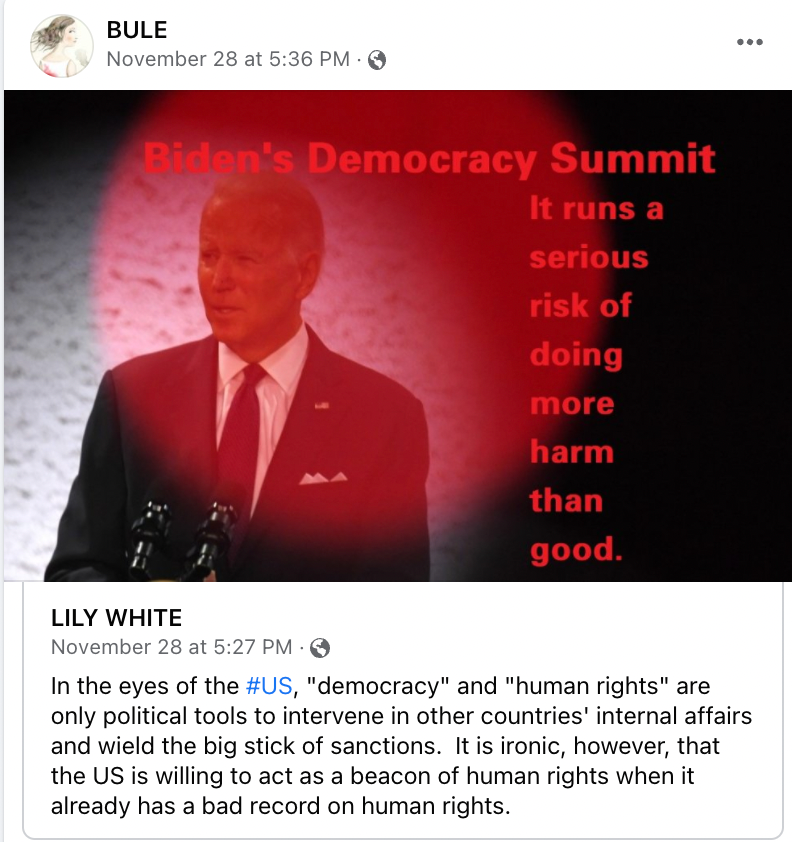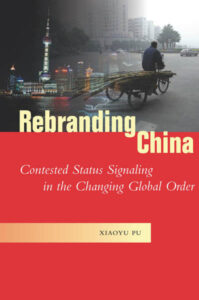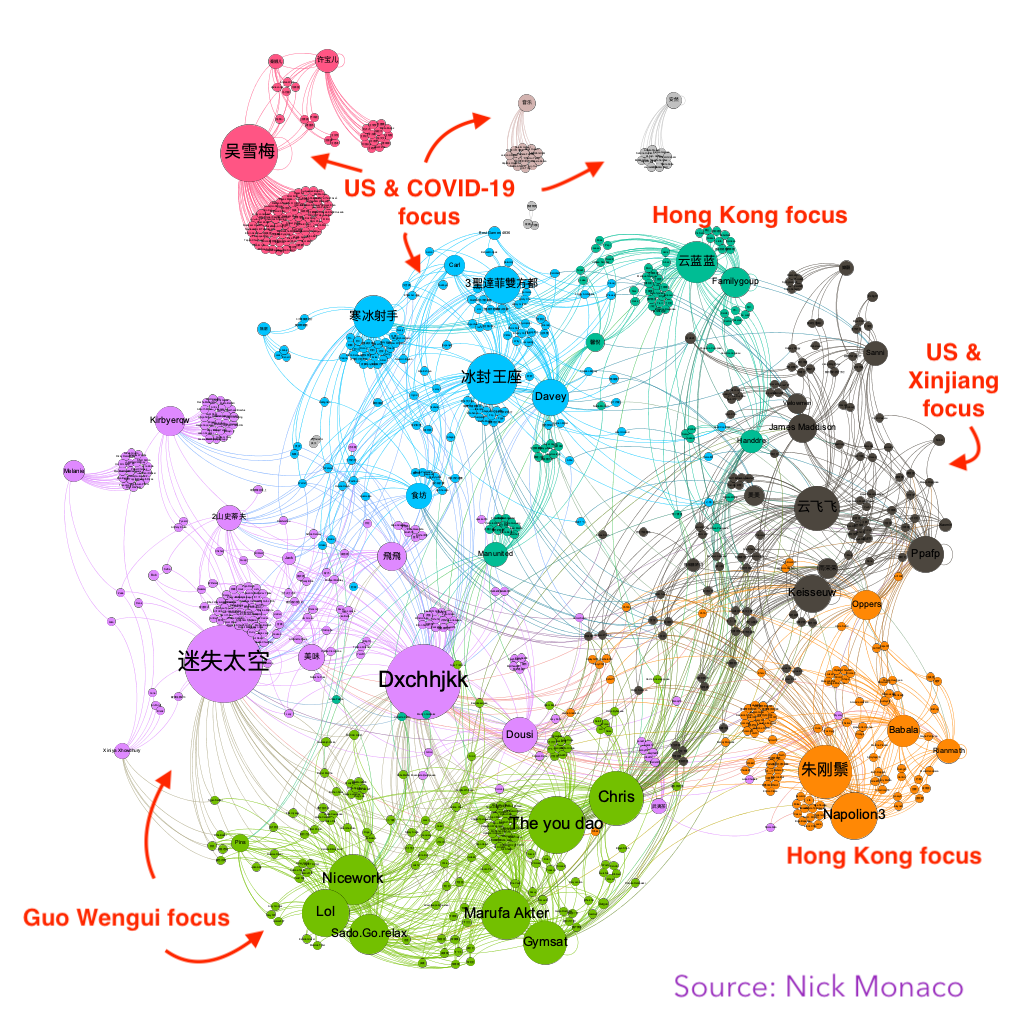
Credit: Miburo
Beijing’s top diplomat in Hong Kong has said the city’s democratic development must be guided by the central government, adding it was time to wake up from the “American-style democracy myth”, The South China Morning Post reports:
Liu Guangyuan made the remarks during a briefing session on Wednesday for consul generals, foreign business chambers and selected media, in which he explained the State Council’s white paper on the subject. One consul general present at the event, said China and the West were now “just talking past each other and a real dialogue has become very difficult”.
Frustrating asymmetry
China’s latest strategy of using Western ‘influencers’ on social media platforms like Twitter and Facebook “is canny because it plays on people’s willingness to trust those who look and
sound like them,” The Washington Post observes:
The tweets of an army of trolls might go ignored by all except those who already believe them, but updates from a beloved vlogger have viral potential built in. Worse, the tactic takes advantage of frustrating asymmetry between China and the West. China bars domestically the same platforms it uses to sow lies abroad, so that it can sway the rest of the world, and the rest of the world can do next to nothing to sway it, or its citizens.
 China’s attempts to claim a scrap of legitimacy by marketing its “whole-process people’s democracy” and its efforts to undermine the Biden administration’s recent Summit for Democracy signal “the inevitability of more fierce ideological confrontation,” according to a pro-Beijing observer.
China’s attempts to claim a scrap of legitimacy by marketing its “whole-process people’s democracy” and its efforts to undermine the Biden administration’s recent Summit for Democracy signal “the inevitability of more fierce ideological confrontation,” according to a pro-Beijing observer.
In the latest example of a blowback against Beijing’s aggressive assertion of sharp power….
Aversion to China’s Communist government has pushed many in Taiwan to stop seeing themselves as Chinese. Now, increased pressure from Beijing is helping fuel a movement on the self-ruled island to speak differently, too, The Wall Street Journal reports.
Next year’s big test will be China’s ban on EU imports containing any Lithuanian-made components, according to CEPA analyst Edward Lucas. This is an attempt to punish and isolate the government in Vilnius for its pro-Taiwan stance. But it is also a direct challenge to the EU, which (as Brexiteers have belatedly discovered) cherishes its single market above all else. China has also failed to deter Slovakia and the new Czech government from pro-Taiwan moves.
The pushback goes far beyond diplomacy. The Chinese Communist Party does not understand the West’s attachment to intellectual freedom and thus underestimates our response when it bullies our media, universities and publishers, he writes for The (London) Times.

National Endowment for Democracy (NED)
In 2009, peaceful street protests in Xinjiang over the deaths of two Uyghur migrant workers in southern China devolved into riots that left an estimated two hundred people dead. Since then, the Chinese Communist Party has deployed relentless propaganda stigmatizing Uyghurs and persuading much of the country’s Han Chinese majority that all members of the ethnic group are potential terrorists, notes Nyrola Elimä, a researcher for the Helena Kennedy Centre at Sheffield Hallam University in the United Kingdom. Her cousin, Mayila Yakufu, has languished in various forms of detention for three and a half years, she writes for The New Yorker.
A new six-part report examines a large-scale disinformation campaign promoting disinformation favorable to the Chinese regime on Facebook, Twitter, and YouTube, Miburo’s Nick Monaco reports. The series, produced in collaboration with the New York Times and available on Miburo’s official substack, addresses several topics, including:
- Spamouflage Survives: CCP-aligned Disinformation Campaign Spreads on Facebook, Twitter, and YouTube
- Five Ways to Spot a Spamouflage Disinformation Campaign
- Cotton the Act: Large-Scale Network of CCP-aligned Facebook Accounts Deny Mass Atrocity in China’s Xinjiang Province.
- Strait Deception: Spamouflage Spreads Propaganda and Stokes Tensions in Taiwan
- Spamouflage’s Ill Will: Anatomizing a Two-Year Pandemic Propaganda Campaign
- Emperor in the Ether: Spamouflage’s Authoritarian Attacks on Democracy and Journalists.

Network visualization of a subset of manually gathered Spamouflage accounts on Facebook shows different content focuses for different clusters. Connections represent likes or shares, nodes are pages and accounts. Larger nodes are “seeds,” producing original content amplified by others.
Hong Kong’s oldest university erected security barriers around a statue mourning those killed in Beijing’s Tiananmen Square in 1989 and posted guards at the site late on Wednesday, in a move that prompted fears that the artwork was to be imminently removed. The 8-metre-high Pillar of Shame by the Danish sculptor Jens Galschiøt has sat on the University of Hong Kong (HKU) campus since 1997, the year the city was handed back to China, The Guardian adds.
Shocking & disgraceful. Hardly a testament to #CCP ideological confidence & robustness https://t.co/45pTqS4IX0
— Democracy Digest (@demdigest) December 22, 2021







